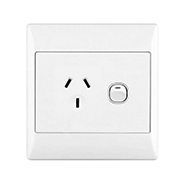New Zealand power adapters - what plugs are used in New Zealand?
What adapter do I need for New Zealand?
You will need to pack a Type I power adapter for New Zealand if your plug doesn't fit in a New Zealand power outlet.
The type of power adapter, power converter or charger that you'll need when visiting New Zealand all depends on the voltage and type of device that you're attempting to use with a New Zealand power outlet. If you're unclear about which voltage your device can use then please read the section below on how to find out the voltage of your device before going any further.
- If you're from America and visiting New Zealand then you will need to use a power adapter to fit a US plug in a New Zealand power outlet. As the voltage is different in New Zealand you also need to pack a power converter if your device isn't dual voltage and ensure that it is compatible with a 50hz power outlet.
- If your device can run on 230 volts or is dual voltage and the plug will fit in a New Zealand power outlet then you can use it in New Zealand without needing anything else.
- If your device is 230 volts or is dual voltage but your plug doesn't fit in a New Zealand power outlet then you will need to bring a suitable plug adapter for New Zealand such a Type I power adapter. A plug adapter for New Zealand (or power adapter) is designed to change the shape of the plug on your device to fit into a plug outlet found in New Zealand, but doesn't convert the voltage from 230 volts to another voltage.
- If your device can't use 230 volts and isn't dual voltage you will also need a power converter for New Zealand to convert the voltage from 230 volts to the correct voltage on your device. You will still need to use a suitable plug adapter for New Zealand if the power converter doesn't have the correct Type I power adapter.
- If you only need to bring USB devices such as a mobile phone or a tablet then a USB travel power adapter is recommended and it should work with any voltage, but make sure that you choose one which has a Type I power adapter otherwise you'll still need to bring along a suitable plug adapter for New Zealand. [3] [AD]
- Excessive use of a cellphone during a trip will leave you with a flat battery quickly, we recommend bringing a portable power bank if you want to recharge your mobile phone or other devices whilst travelling to an unknown country.
New Zealand power adapters
Power adapters for New Zealand
When planning a vacation it can be useful to know if you'll be able to power any indispensable devices that you'll be bringing along with you. However, by not knowing which power socket is being used you could end up either weighing your suitcases down with too many spare adaptors or bring the wrong power adaptor, leaving you needing to buy or borrow a potentially expensive power adaptor when you need it. Varying complicated standards and voltages can often cause confusion when planning to stay in a different country, especially if you've never visited before. With only a handful of different types of common standards being used throughout the world this article shows exactly what you'll need in advance to power your device in New Zealand. This page has links to instructions which shows exactly how to charge your devices when you're travelling to New Zealand using the standard 230 volt 50Hz I Type plug outlet, with the New Zealanders using a special AS/NZS 3112 plug for wall outlets. Most power sockets will change depending on which country you are travelling to therefore we suggest reading the travel power adapters page for a full list of regions and countries.
What is the best power adapter for New Zealand?
The best power adapter for New Zealand is a Type I power adapter which will allow you to use any 230 volt device or appliance. [3] [AD]
What is a power adapter for a New Zealand power outlet?
A power adapter is a compact and lightweight plastic adapter that permits a different shaped power plug on an appliance from another region to fit into a power socket in New Zealand.
Also known as: an electrical adapter, plug adapter, travel adapter, electrical adaptor, mains travel adapter or power adaptor. [5]
Will a power adapter change the voltage from a New Zealand power outlet?
Power adapters will only adapt the shape of a plug to fit into a 230 volt New Zealand power outlet and is unable to convert the power to a higher voltage. If you wish to safely use a 100-120 volt device you also need to bring a step down power converter for New Zealand along with the correct power adapter.
What does a power adapter do?
A power adapter allows visitors travelling from another country to use electrical appliances and devices in New Zealand simply by altering the shape of the plug.

Arriving at an airport
Where to buy a power adapter in New Zealand
On arrival power adapters could be found in local electrical high street shops and drug stores, but always check the build quality first as safety standards might be different in a foreign country as this is important when dealing with electrical goods. Keep in mind that a shopping trip searching for power adapters in an unknown location might be impractical, especially as this needs to happen quickly before batteries run out.
Hotel receptions could have a power adapter for sale, hire or as a complimentary extra for guests; however, availability is normally limited and a hotel might not have the exact type required for your country. If in doubt, call ahead to the hotel first and request a reservation as it is unlikely that an adapter will be found in your room on arrival.
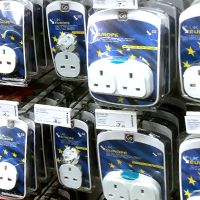
Power adapters for sale in an airport
Where to buy a power adapter for New Zealand
Power adapters are most likely be available in major airports prior to departure, however the range of adapters might be limited to popular destinations. It is recommended to research the exact type of adapter required prior to shopping at the airport. Look in the travel accessories section of airport newsagents, electronic stores and pharmacists but expect to pay 50% more than regular prices. Airports will be your last chance to buy a power adapter before departure, always check the returns policy to ensure you can easily exchange or refund a faulty or unsuitable product in an airside shop.
It will be more convenient and cheaper to buy the correct power adapter in advance of your trip. High street stores normally sell popular types of travel adapters to popular locations but for widest choice it is recommended to buy a power adapter online.
Electrical adapters for New Zealand
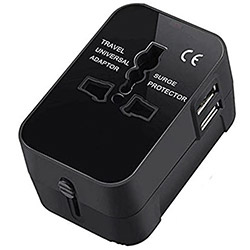
A universal travel adapter
Universal Travel Power Adapters
Benefits of a universal travel power adapter
- Useful when visiting to multiple countries. Typical models are designed to function in around 150 countries.
- All in one compact design, small and lightweight.
- There are some universal travel adapters that include USB charging ports.
- Straightforward operation.
- There are some universal travel power adapters which have a surge protector built in, this will prevent your device from being overpowered by an unstable power grid in some countries.
- The retracting pins don't catch against other items when packed in your luggage.
- A universal travel power adapter can be useful back at home as a USB charger.
- Changes shape to Types A/B, E/F, G and I plugs so will fit in a New Zealand power outlet.
Disadvantages of a universal travel power adapter
- Must not be used with any high powered appliances; for example clothes irons, hair straighteners, kettles or curling irons.
- The shutters and internal moving parts might be fragile on some models which could make them likely to possibily jam when travelling.
- Only provide power to a single plug.
- A universal travel power adapter might not be completely universal; some models might not cover certain countries with less popular power outlet types.
- Universal travel power adapters lack an in-built power converter meaning they aren't suitable for non-230 volt electrical appliances. [6] [AD]
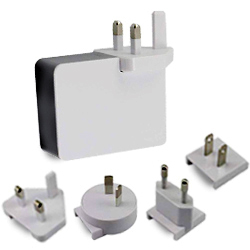
A compact USB travel wall charger
Travel USB Wall Chargers
Benefits of a travel USB wall charger
- Ideal for situations when you only need to power USB devices such as tablets, iPhones and MP3 players.
- Rather than carry lots of domestic power chargers you only have to bring one unit.
- Supplied with swappable adapter heads making them versatile in a large number of different locations. Interchangeable adapter heads which are supplied with travel USB wall chargers are typically small and lightweight which makes them easy to fit into hand luggage.
- Offers a surge protector.
- When you return to your home country it should still be of use.
- The swappable heads will fit into Types A/B, E/F, G and I outlets so will work with a New Zealand power outlet.
Disadvantages of a travel USB wall charger
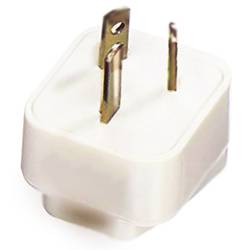
An easy to use Type I plug adapter
Power Plug Adapters
Benefits of a power plug adapter
- Bringing a Type I power adapter will work in New Zealand.
- Simple to use.
- Cheapest option.
- Small and lightweight.
Disadvantages of a power plug adapter
- If you plan on travelling to more than just New Zealand you may need to pack multiple plug adapter types for other countries.
- Only modifies the actual shape of the plug to fit in a Type I New Zealand power outlet but not the voltage used in New Zealand, so if your device doesn't support 230 volts and isn't dual voltage then you'll still need to bring a separate voltage converter.
- 1 adapter per plug - for every individual appliance you wish to bring you will also need to use a separate power adapter.
- Hotel rooms in New Zealand might only have one wall outlet available, therefore you'll only be capable of powering a single device at a time.
- You will also need to pack a separate USB charger if you wish to power any USB device. [3] [AD]
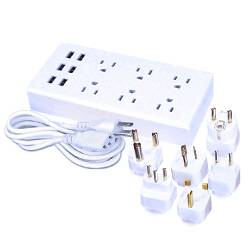
Travel power strips including adapters
Travel Power Strips
Benefits of a travel power strip
- A travel power strip is able to charge more than one electronic appliance at the same time via one New Zealand power outlet.
- You will find certain models of power strips offer voltage conversation for lower wattage devices such as laptops or cameras. So therefore if your electronic device isn't dual voltage it can still be used with a New Zealand power outlet when using only a travel power strip, making them a cheap lightweight substitute for a power converter.
- Most power strips should also include multiple USB charge ports.
- Offers surge protection. Voltage from power grids in some areas might be tempremental, a surge in power might damage your devices. Some power strips will have a surge protector built in to protect any device from being overloaded.
- It can potentially be functional in your home country.
- US and Canadian power strips include Type A, B, D, E/F, G, H, I, L and N plug adapters so should work in New Zealand.
Disadvantages of a travel power strip
- Unlike dedicated voltage converters, the power converter on a travel power strip won't work with high wattage appliances such as curling irons or hair straighteners.
- Because of the size of a power strip it might be unsuitable for carrying in hand luggage.
- Travel power strips might be considered excessive if you only have a small number of appliances and devices that need powering. [8] [AD]
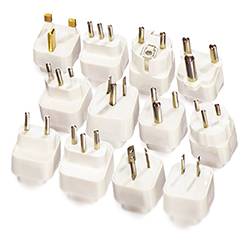
A plug adapter set
Plug Adapter Sets
Benefits of a plug adapter set
- An adapter set will typically work out more cost-effective than buying multiple individual plug adapters for multiple locations.
- Covers every eventuality and not just a New Zealand power outlet.
- For anyone travelling to multiple locations a power plug adapter set is the most flexible option.
- Set includes Type A, B, C, D, E/F, G, H, I, J, L, M and N adapters so should be compatible with a New Zealand power outlet.
Disadvantages of a plug adapter set
- Involves planning - you'll have to choose which plug adapters to pack, or alternatively bring each adapter type along.
- Lots individual items to bring along.
- Having only one working power adapter the remaining power adapters will be useless using up space.
- Not every plug adapter types are typically included in the set (and especially less common adapters) - so check that your set has an adapter which works in New Zealand.
- Each plug adapter only alters the shape of the plug to fit in a New Zealand power outlet but not the voltage. [9] [AD]
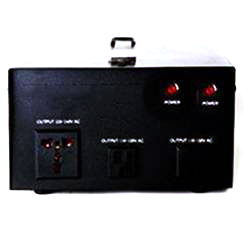
A voltage converter has surge protection
Voltage Converters
Benefits of a voltage converter
- Step down voltage converters will let you to use any non-230 volt appliance with a 230 volt power outlet in New Zealand.
- A voltage converter includes a built in surge protector that will prevent your electronics from being overpowered.
Disadvantages of a voltage converter
- A voltage converter only changes the 230 volts from a New Zealand power outlet and won't change the shape of the plug to fit into a New Zealand power outlet, therefore you will still need to pack the correct type of plug adapter.
- The size and weight of most models makes them unsuitable for carrying in carry-on luggage.
- An expensive power converter won't be useful after your trip to New Zealand.
- Often much cheaper to bring a dual voltage travel appliance than to purchase an expensive voltage converter just in order to power your existing single voltage appliance in New Zealand.
Comparison of electrical adapters for New Zealand
| Type I Power Plug Adapter |
Universal Travel Power Adapter |
Travel USB Wall Charger |
Travel Power Strip |
Plug Adapter Set |
Voltage Converter |
|
|---|---|---|---|---|---|---|
| Can be used in New Zealand | Yes | Yes | Yes | Yes | Yes | Yes |
| Types of plug included | I | A/B, E/F, G and I | A/B, E/F, G and I | A, B, D, E/F, G, H, I, L and N | A, B, C, D, E/F, G, H, I, J, L, M and N | B |
| Compatible number of countries (A) | 20+ | 150+ | 150+ | 200+ | 230+ | 230+ |
| Fits in a Type I New Zealand power outlet | Yes | Yes | Yes | Yes | Yes | • |
| Additional Type I plug adapter required to fit in a New Zealand power outlet | • | • | • | • | • | Yes |
| Useful when you return home | • | Yes | Yes | Yes | • | • |
| Typical combined number of USB ports and AC outlets | 1 | 3 | 4 | 7 | 1 | 2 |
| Powers USB devices | • | Yes | Yes | Yes | • | • |
| Typical number of USB ports | 0 | 2 | 4 | 4 | 0 | 0 |
| Powers a 230 volt AC appliance in New Zealand | Yes | Yes | • | Yes | Yes | Yes |
| Typical number of AC outlets | 1 | 1 | 0 | 3 | 1 (B) | 2 |
| Converts voltage (?) | • | • | • | Yes (C) | • | Yes |
| Surge protection | • | Yes | Yes | Yes | • | Yes |
| Typical dimensions | 2.6 x 1.9 x 1.4 inches | 3 x 2.1 x 2.1 inches | 4.3 x 3.4 x 1.3 inches | 6.6 x 3.6 x 1.5 inches | 7.1 x 3.9 x 2.8 inches | 11.7 x 8.1 x 6.7 inches |
| Typical weight | 4.5 ounces | 4 ounces | 4.5 ounces | 1.6 pounds | 13 ounces | 20 pounds |
| Typical number of items to carry (D) | 1 | 1 | 5 | 8 | 12 | 2 |
| Suitable for hand luggage | Yes | Yes | Yes | • (E) | • (F) | • |
| Buy | Buy | Buy | Buy | Buy | Buy |
New Zealand power outlets and plug sockets
How do I use a 110 volt appliance in New Zealand?
Use a step down power converter should you need to use a 110V or 120V appliance in a New Zealand power outlet.
What is the electrical frequency used in a New Zealand power outlet?
The frequency of the alternating current from a New Zealand power outlet is 50 Hz. [11]
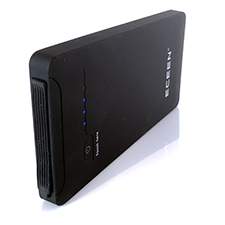
Portable charger for charging cell phone
Should I bring a portable charger to New Zealand?
Although power blackouts in New Zealand aren't regular and power is available throughout the country, travellers should still bring a power bank to recharge cell phones.
- During a trip to New Zealand increased use of mobile phones for storing calendars, taking photographs, social network sharing, getting directions and staying entertained can syphon off power excessively. Beyond the inconvenience of missed photo opportunities a flat smart phone battery can possibly leave you without enough power to make an emergency call or being able to use a GPS app to return back to your accommodation. By packing a portable power bank eases those concerns as it allows you to keep your cell phone powered without using a New Zealand power outlet.
- We recommend bringing at least a 10,000mAh portable charger which will supply enough energy to cover over three full charging cycles while a 20,000mAh portable charger should keep an average smart phone powered for up to seven days.
- Should you need to charge your laptop in New Zealand and it it supports USB-C charging then use a portable charger for a laptop marked with PD (power delivery) and a model supplying at least 20 Wh.
- Before travelling please note that some airlines won't allow you bring portable chargers on an aircraft that supply 100 Wh of power or more and must not be left in checked-in luggage.
- Average consumer power banks aren't powerful enough for high powered items that generate heat, but a rechargeable hair dryer or rechargeable cordless flat iron are designed for travelling. [4] [12] [13] [14] [15] [16] [AD]
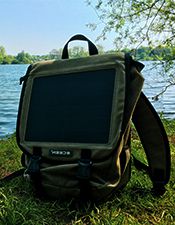
Solar bags will recharge most USB devices
Do solar chargers work in New Zealand?
The climate in New Zealand might be suitable conditions for a solar power bank, however it could take time to charge. Because of the reduced surface area a solar power bank will need to be left in strong daylight for an extended period of time to produce enough power for a single charge cycle, and this might prove difficult to constantly pack and unpack a solar power bank and wait for it to recharge in a sunny area.
- Instead, the bigger cells used on a solar backpack will give the bag the ability to generate more electricity within a shorter period of time, and might generate some power when overcast.
- Phones that are plugged directly into a USB charging port of a solar backpack should gradually top up the power during sunny spells in New Zealand, but this could be inconvenient to have it constantly tethered to the bag if it is to be needed constantly. Therefore it is recommended to plug a normal battery power bank into a solar backpack which can then be constantly recharged inside the bag during sunlight, afterwards the phone can be powered up using the power bank at any time without daylight.
- A bag which is suitable for New Zealand should have a solar cell efficiency of at least 22%, can generate a minimum of 6 watts of energy and can be used with a power bank of 10,000mAH or greater.
- Solar bags come in backpack, rucksack and messenger styles making them ideal for work, travel and domestic use.
- The flexible and durable solar cells used in solar powered bags are designed to endure bending and scratching, unlike regular solid solar panels. [4] [17] [18] [AD]
Sources
- International Electrotechnical Commission - World plugs by location (cited August 2014)
- Wikipedia - Mains electricity by country (cited July 2014)
- Index Mundi - Power outages in a typical month (cited May 2018, data collected between 2006 to 2017)
- Index Mundi - Access to electricity (cited May 2018, latest data collected 2010)
- WikiPedia - List of countries by average yearly temperature (cited May 2018, data averaged between 1961 to 1990)
New Zealand chargers
What is a USB travel power charger?
A USB travel charger is a dual voltage charger with interchangeable plugs and multiple USB ports, suitable for charging multiple USB powered devices when travelling abroad.
Why use a travel USB charger for New Zealand?
- Normal travel USB chargers include 4 or more USB charger ports, meaning you only need to bring a single charger to charge all your devices. Instead of bringing 4 individual power chargers it's now only necessary to pack one 4 port USB wall charger and power up to 4 devices which cuts down on the size and weight of your baggage.
- Most travel USB chargers will include swappable plug heads for different countries. This is suitable when travelling across different countries which will probably use different power outlets to New Zealand.
- Good USB chargers are rugged, lightweight and compact; ideal for rigors of travel instead of than risking packing a domestic charger which might be hard to replace or repair in New Zealand.
- USB travel chargers can accept the 230 volt power outlets in New Zealand along with other voltage standards across the world.
- It's possible that some hotel rooms or accommodation in New Zealand might only have one power outlet, by using a travel charger with multiple USB ports means you can share out the single wall outlet with all your devices rather than having to wait to recharge one device at a time.
- Due to their versatile nature they take the worry out of visiting any unknown country as they are guaranteed to work practically anywhere on the planet.
- Power outlets in airports can be in short supply and demand for charging multiple cell phones and tablets from other passengers during departure can be high, so a USB charger with multiple ports and the capability to fast charge is ideal.
- Some countries power grids are unstable, a quality travel USB charger allows for unexpected fluctuations to prevent damage to any devices attached to it. Attempting to repair an overloaded smartphone in New Zealand could prove to be inconvenient and expensive.
- Higher priced USB travel chargers will also incorporate power outlet strips to plug in multiple low powered devices such as laptops, however these are unsuitable for high wattage domestic such as hair dryers or clothes irons. For further information please refer to the guide on using travel appliances in New Zealand for guidelines on the most suitable power adapter for a high powered devices in a New Zealand power outlet.
- Some mobile phones and tablets could require more than the standard 500 milliamps supplied by a normal 5 volt USB power adapter to charge or provide fast charge. Ensure that the USB power adapter can support fast charging should some of your devices require extra power.
- Travel USB power chargers can still be useful back at home by recharging multiple mobile phones and tablets every night using one power outlet. [7] [AD]
What is the best USB charger for New Zealand?
A 4 port USB travel charger is the most compact option for travellers from around the world who only have USB devices, but for visitors also wanting to use their domestic plugs the following power adapters provide larger but more versatile solutions. All three power strips offer surge protection which is necessary when visiting regions with unstable power supplies. These travel adapters come with interchangeable type C, I and G plugs covering Europe, North America, Australia, United Kingdom, Japan, China and over 150 countries around the world:
- BESTEK Portable International Travel Voltage Converter - The BESTEK travel adaptor has 4 USB charging ports with 3 AC power outlets and is the most popular compact power converter for travellers originating from North America going to New Zealand using type B plug sockets.
- ORICO Traveling Outlet Surge Protector Power Strip - Similarly having 4 USB ports but only 2 AC power outlets the travel adapter from Orico is also aimed at travellers from North America using type B plugs and is a much more cost effective alternative to the BESTEK with only 1 less AC outlet at almost half price.
- BESTEK International USB Travel Power Strip - This power strip has just 2 AC outlets but offers a more generous 5 USB charging ports. This versatile power strip is compatible with both American plugs and popular plug types A, D,E/F, G, H, I, L and N making it perfect for a majority of travellers from around the world visiting New Zealand. [7] [AD]
Power converters for New Zealand
What is a power converter for a New Zealand power outlet?
Power converters for New Zealand allow travellers to use their 100, 110 or 120 volt electrical device with a 230 volt New Zealand power outlet.
Also known as: electrical converter, electrical transformer, voltage converter, power transformer or voltage transformer.
What is the difference between a power converter and a plug adapter?
An expensive and heavy power converter transforms the voltage of 230 volts from a New Zealand power outlet to work with a non-230 volt device, however a more lightweight and cheaper power adapter (or plug adapter) changes the shape of the plug on your device to fit into a power outlet found in New Zealand. [10] [AD]
Do I need a power converter for New Zealand?
When travelling to New Zealand from another country check the device can be charged using a 230 volt power supply.
- A step down power converter is needed if you are travelling from a country that uses 100-120 volts and your appliance is incompatible with 230 volts. See our WikiConnections world power outlets guide to find out the voltage is used in your country.
- You won't need a power converter if you already own either a single voltage appliance that works with 230 volts or one that is dual voltage.
- Typically, electrical devices which are designed to use a lower voltage such as 120 volts and used in a 230 volt outlet run the potential risk of blowing a fuse, damage to your device or even an electrical fire hazard unless you use a step down power converter.
- You won't need a converter if you wish to recharge a smaller electrical device such as a mobile phone as these are normally dual voltage and designed for international use, however please always check the device for dual voltage support prior to your journey.
- For powering high wattage appliances or generate heat (for example hair straighteners and clothes irons) then you will need to use a much larger higher wattage heavy duty power converter.
- Investing a smaller robust dual voltage travel appliance could be more practical and cost effective than investing in a heavier high wattage power converter in order to use your existing domestic appliance in New Zealand.
- Read these comprehensive guides on travelling with clothes irons, curling wands, hairdryers and flat irons with New Zealand power outlets which includes advice on some affordable dual voltage alternatives. [10] [19] [AD]
What kind of converter do I need for New Zealand?
If you need to use any 100, 110 or 120 volt appliance in New Zealand you will need a step down power converter. [10] [AD]
What voltage does New Zealand use?
New Zealand uses 230 volts in their power outlets. [2]
How to convert 230 volts to 110 volts
- Use a step down power converter to allow you to use a 110 or 120 volt appliance with a 230 volt New Zealand power outlet.
- If the power converter doesn't include the correct shaped plug then it will also be necessary to plug in the power cord from the power converter into a power adapter for New Zealand before plugging that into a New Zealand power outlet.
- Some power converters include the ability to perform both step up and step down voltage conversions, therefore it may be necessary to manually switch the converter to output the voltage to the 110-120 volt range.
- Plug your appliance into the converter and turn the power on, your 110-120 volt appliance can now be used with a 230 volt New Zealand power outlet. [10] [AD]
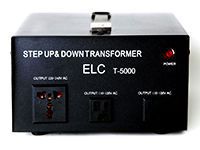
Voltage converter
What is the difference between a converter and a transformer?
Converters and transformers are both used to change one voltage to another, but this ambiguity can cause confusion as their purposes are different:
- Power converters are designed for simple electrical appliances which typically generate heat or use motors such as clothes irons, shavers or hair dryers. Transformers are designed for more complex electronic items such as televisions or games consoles.
- Buying a power converter is cheaper than buying a power transformer.
- Power transformers are larger and heavier making them more suited for permanent residential use; for example an expat wishing to use an imported television would need to use a transformer for this purpose.
- Power converters are more suitable for travellers wishing to bring domestic appliances abroad such as hair dryers or flat irons. However, it is more practical and cost effective to purchase a dual voltage appliance designed for travel rather than a heavier power converter.
- Power converters are suitable for 2 pin ungrounded appliances, it could be harder to find a converter if you want to use a grounded 3 pin appliance.
- Transformers can be used constantly however it is recommended that converters are used for no longer than a couple of hours at a time.
- Shops may sell transformers under the name of converters, for the purposes this guide we will be referring to both converters and transformers as converters.
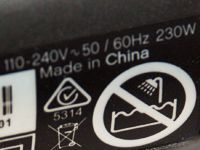
Dual voltage hair straighteners
Is my device single voltage or dual voltage?
The easiest method to tell if your appliance is either single voltage or dual voltage is to look for a sticker on the supplied power adapter or on the device itself, normally near to where the power cord sits. This location might vary depending on the make or model of your device, it could also state on the box.
- Single voltage devices could have a specific number - such as 120V.
- Single voltage devices might also say a small voltage range (20 volts difference) with a dash to accomodate small voltage fluctuations - such as 220-240V.
- Dual voltage devices will typically say a large voltage range separated with a slash - such as 100/240V.
Substantiations
See the power adapter substantions section for more information on how we compared travel adapters.
What type of adapter do you need for New Zealand?
Which type of power adapter do you need for New Zealand?
The type of plug adapter or power converter that is suitable for New Zealand will depend on your requirements. Prior to deciding the right adapter to buy we recommend using this checklist:

Make a list of items to bring
What types of devices do you need to use in New Zealand?
- There are 3 types of electrical devices:
- Low wattage electrical items that plug into a power outlet - for example cameras and laptops.
- High wattage electrical appliances which can be plugged into an electrical outlet - for example hair dryers or curling irons.
- USB powered devices that connect to a USB port - for example mobile phones.
- If you only want to bring along just USB powered devices you'll find that a simple travel USB wall charger is ideal as you will only have to bring that single compact charger with your USB charging cables and leave your domestic chargers at home.
- A travel power strip is built for providing power and voltage conversion for many low wattage devices, but unsuitable for high wattage appliances which need voltage conversion.
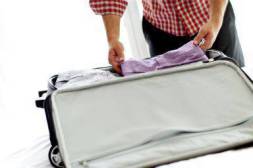
How many electrical items are you packing
How many electrical devices are you taking to New Zealand?
- Trying counting how many electronic you intended on bringing with you to New Zealand (for example cell phones, tablets, laptops, eReaders, curling irons or hair dryers).
- Take into account that you might own more devices in the future. Are you thinking about purchasing a new cell phone computer next year?
- There is a growing number of rechargeable electronics such as electric shavers which utilise a USB port for their power source. The if you have to replace a device it might need a USB power adapter so remember to check that your travel adapter has enough spare ports to support these additional devices too.
- Will you be travelling with a partner who will need to recharge their phones?
Will your appliances and devices only work with a 230 volt power outlet?
- New Zealand uses 230 volts, so if you travel from a country that isn't 230 volts and you don't have a dual voltage appliance (how you can tell) then you'll either need to bring a heavy voltage converter or a lighter power strip with a built in power converter.
- It could be costlier to buy a power converter instead of using a dedicated dual voltage travel appliance (such as a dual voltage clothes iron, hair dryer, curling iron or hair straighteners for New Zealand) which is ideal for travel and often includes plug adapters.
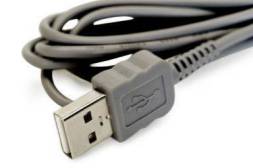
Will you only bring USB items
Will you only be planning on charging USB devices in New Zealand?
- If you intend to use devices such as mobile phones for New Zealand then we suggest just bringing a travel USB wall charger.
- If you only use a simple power plug adapter then you will still need to pack your domestic USB charger too. [7] [AD]
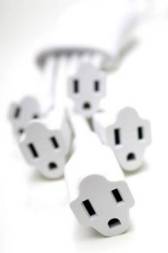
Are multiple wall outlets available
How many New Zealand power outlets will be available?
- Your accommodation in New Zealand might only have one power outlet on the wall, this will present an issue if recharging the batteries of more than one item overnight because you can only recharge a single device at a time then have to keep swapping.
- To charge more than one device at the same time look to using either a travel power strip or USB wall charger that can power multiple USB ports or outlets. [8] [AD]
How much can you afford?
- A cheap power adapter which charges one single device in one country (provided that it is dual voltage or is compatible with 230 volts) but investing in a small amount more will allow you to charge more than one device at once and you will be able to use them in multiple different countries.
Do you plan on visiting elsewhere in the future?
- A USB wall charger with interchangeable heads or versatile universal travel adapter can potentially be reused for other trips in the future for other countries.
Is New Zealand the only place you'll be visiting?
- A single power adapter will only work in the one country that it was built for, therefore if you are visiting more than a single country you'll need to carry additional power adapters which can in turn add to the number of adapters you have to pack.
- However, travel USB wall chargers and universal travel adapters are perfect for travelling to multiple countries due to the inclusion of interchangeable heads.

Arriving at an airport
Are you flying long haul to travel to New Zealand?
- For much longer journeys consider bringing a convenient airport-friendly charger that works in different power outlet types, one which can be packed in carry-on luggage and can be used to quickly top up phones and tablets.
- Not all planes and airports have power outlets for customers therefore we recommend packing a travel portable power bank for recharging on the go. After landing in New Zealand you could need to use a cell phone to make a call, messenging, using sat nav or viewing itineraries; so make sure that your phone has ample battery power left. [4] [AD]

Are you only using hand luggage
Are you only bringing hand luggage to New Zealand?
- Due to the increased size and weight voltage converters and travel power strips are too heavy for carrying in hand luggage, we recommend bringing either a USB wall charger or a smaller universal power adapter instead. [6] [AD]
Do you still need use your charger when returning home?
- Most types of travel USB chargers and travel power strips might still work when you return back home (should they include a domestic plug).
Are you visiting other countries with good access to power?
- The voltage in New Zealand is generally stable but if you plan to visit another country you may need an adapter which offers protection to your devices. The power could sporadically fluctuate in some areas and this could cause damage to your devices, so you will need to look for an adapter which offers built in surge protection such as a travel power strip.
- Using a solar backpack or portable power bank will prepare you for a power cut and countries with limited electricity. [4] [4] [17] [AD]
What can I connect to a New Zealand power outlet
Travel appliances which can plug into a New Zealand power outlet
Beats Pill speakers which can connect to a New Zealand power outlet
Jabra Bluetooth speakers which are compatible with a New Zealand power outlet
Mobile phones that can be connected to the New Zealand power outlet
Apple iPhones which can connect to a New Zealand power outlet
Samsung Galaxy phones that can connect to a New Zealand power outlet
Amazon Kindle tablets which work with a New Zealand power outlet
A list of Apple iPads which are compatible with a New Zealand power outlet
Corrections
We endeavor to ensure all details on this page are correct and relevant to travellers visiting New Zealand, if you wish to contribute any useful information or feedback please email travel@wikiconnections.org. For more comprehensive technical details visit the Wikipedia page on AC power plugs and sockets. [20]
Disclaimer
WikiConnections is not responsible for any injury or damage caused due to using any type of suggested product with any other electrical device or appliance in any location, full details are available on the disclaimer page. While WikiConnections strives to make the information on this website as timely and accurate as possible, we make no claims, promises, or guarantees about the accuracy, completeness, or adequacy of the contents of this site, and expressly disclaim liability for errors and omissions in the contents of this site. All functions and capabilities should be checked prior to purchasing or using any power adapter. Assumptions on if any power adapter, charger, converter or power strip works in any location is based on data from publicly available sources and if it fits the primary power outlet used in that country. WikiConnections has not taken into consideration other less common power outlets which might be found as these might only be used in certain areas or in the process of being phased out.
Where possible, WikiConnections only recommends the type of product as being suitable along with alternatives and does not make any endorsement for any specific brand or product. Always check with the manufacturer to ensure full compatibility prior to attempting to use any device. Always check the reputation of the manufacturer and product to ensure the quality and safety of any electrical device being used.
External links
We endeavour to ensure that links on this page are periodically checked and correct for suitability. This website may receive commissions for purchases made through links on this page. As an Amazon Associate WikiConnections earn from qualifying purchases. For more details please read the disclaimers page.
- Wikipedia - wikipedia web page about New Zealand.
- iec.ch - International Electrotechnical Commission World Plugs
- Type I power adapter - A Type I electrical adapter, compliant with AS/NZS 3112, fits in a standard Australia electrical outlet. This adapter features two flat pins in an inverted V-shape with an earthing pin and is also commonly used in New Zealand, China, and Argentina..
- Portable power bank - Portable power banks are invaluable batteries for travel, especially in unfamiliar locations. Advanced charging technologies offer fast and efficient power delivery to mobile phones, tablets and headphones via USB ports..
- Wikipedia - power adaptor
- Universal travel power adapter - The universal travel power adapter is a versatile single solution for power on the go, compatible in over 150+ countries worldwide. A single unit compact design makes it a travel essential which easily fits into any travel bag..
- Universal multi-device USB wall charger - Designed for international use, universal wall chargers includes interchangeable regional plug heads which supports 100V to 240V voltages, making them ideal for powering USB devices in over 150 countries..
- Travel power strip - Combining surge protection, AC outlets, USB ports and swappable plug adapters, the travel power strip is a comprehensive power solution for global travellers..
- Power adapter set - A plug adapter set is a future-proof travel essential, containing various adapters to fit diverse power outlets around the world to ensure compatibility in a wide range of countries..
- Step down power converter - Step-down power converters are engineered to safely convert higher voltages of 220V / 240V to 110V / 120V, allowing the use of appliances designed for lower voltage systems to be used in countries with higher voltage power outlets..
- Wikipedia - WikiPedia - Mains electricity by country -
- Rechargeable hair dryer - Rechargeable hair dryers ideal for travel are lightweight and cordless for mobility, have low-heat settings for hair health, and a fast-charging battery for time efficiency. USB charging gives a wide range of charging options when travelling..
- Rechargeable cordless flat iron - Modern rechargeable cordless flat irons use advanced battery technology for consistent temperature control. Suitable for airline safe travel with universal voltage and USB charging capabilities..
- 10,000mAh portable charger - A portable charging device with a 10,000mAh capacity, commonly used for extending the battery life of mobile phones and other small electronics..
- 20,000mAh portable charger - A high-capacity charging device featuring 20,000mAh energy storage, capable of multiple charge cycles for mobile phones and some tablets. Suitable for extended periods away from power sources..
- USB-C PD power bank - A USB-C PD power bank utilises Power Delivery technology to facilitate high-speed charging, particularly for laptops requiring substantial power. A high wattage power bank ensures fast and efficient energy transfer, supporting USB-C enabled devices..
- Solar backpack - Incorporating large solar panel with USB outputs, solar backpacks are ideal as a reliable secondary source of energy for device charging in remote travel locations where electrical outlets are unavailable or unreliable..
- Solar power bank - Solar power banks integrate photovoltaic cells to offer a self-sustaining charging option, ideal when a backup power source is required for locations where electrical outlets are unreliable, scarce or unknown..
- Heavy duty power converter - Heavy-duty power converters robust voltage transformation capabilities for designed for high-wattage devices, making them best suited for appliances like kettles and hair dryers that consume a significant amounts of power..
- Wikipedia - AC power plugs and sockets -
